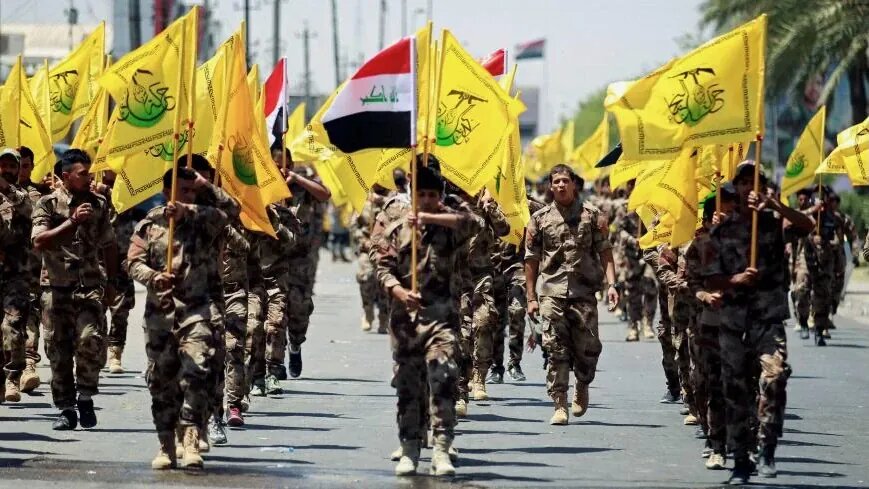By Wesam Bahrani

TEHRAN – Amid fluid regional developments, a media-driven propaganda campaign has been waged against Iraq’s Hashd al-Shaabi, also known as the Popular Mobilization Units (PMU).
Some Iraqi satellite channels have tried to join the bandwagon against the Hashd al-Shaabi.
Fabrications against the PMU’s dissolution have long circulated on social media platforms but Iraqi satellite station al-Rasheed took the disinformation campaign to another level.
In a news broadcast, the TV station ran a report based on an alleged informed source about meetings between Iran’s IRGC Quds Force Commander General Esmail Qaani, Iraqi Prime Minister Mohammed Shia al-Sudani, and several PMU commanders.
According to an “informed source”, General Qaani entrusted the decision regarding the future of the Iraqi PMU to the Iraqi government and asked the commanders to act in line with the official stance of the Iraqi government. The meetings reportedly lasted only a few hours.
The media focus on dissolving the PMU did not even merit a response from the state military institution itself nor the Commander in Chief of Iraq’s Armed Forces, the Office of Prime Minister al-Sudani.
Experts familiar with the Iraqi security apparatus told the Tehran Times that it isn’t surprising to see the Arab state’s most instrumental defense forces are being targeted by media networks, pushing for a foreign agenda amid regional developments recently.
The role of this disinformation campaign is to create an environment hostile against the PMU both inside and outside Iraq.
There are several factors behind the establishment and role of the PMU, which renders the allegations against it void and laughable to an extent.
The PMU was established in the summer of 2016 following a Fatwa by Iraq’s highest religious authority, Ayatollah Sayyed Ali al-Sistani.
The Fatwa was for anyone capable of carrying arms to volunteer and help national security following the collapse of the U.S.-trained army and fight the Daesh (ISIS) terrorist group that had occupying large swathes of Iraqi territory.
There is no question that Iranian military advisors, at the invitation of the Iraqi government, helped train, arm, and take part in battles involving the newly established PMU, essentially putting their lives at risk.
That is the extent of Iranian involvement.
Suggesting otherwise is to “pollute public minds and those in the region that the PMU is not a national force serving Iraqi interests”, experts highlighted.
As the PMU grew into a critical security force safeguarding the capital, Baghdad, along with all other towns and cities, the Iraqi Parliament rushed to integrate the units under the Iraqi Armed Forces.
One expert pointed out that media reports implying Iran’s General Qaani rules over the PMU, deciding whether it can be dissolved or lay down its arms, failed a long time ago in the “disinformation war waged by the West, its regional and local puppets”.
Why now?
Such reports have resurfaced as Iraq’s neighbor Syria faces a transition from its long-term ruler, President Bashar al-Assad, to mixed groups, many with fighters wanted in Iraq for terrorist activity.
Disbanding the PMU at any time would be unimaginable, but especially at this critical juncture when Iraq has significantly boosted its security presence on the border with neighboring Syria amid concerns of instability spilling over to Iraq.
Nevertheless, the PMU has had very strong ties with consecutive Iraqi governments since its establishment in June 2014.
Had it not been for the popular forces, there would not have been a government in Baghdad today. The units sacrificed the most men from all classes of society on the front lines against Daesh terrorists to ensure the security of Iraq.
The salary and pensions of its soldiers are paid by the central government, and it answers to the Iraqi Commander in Chief.
Furthermore, the PMU operates in many regions of Iraq to counter terrorism activity while also providing other security and welfare services.
Disbanding the units, which make up the fabric of Iraqi society, is one of the most ludicrous ideas thrown about by those executing the agenda of the Israeli regime and its staunchest supporter, the United States.
The PMU has a quota system, which means there are more Sunnis in the force than there are in the regular army.
Likewise, there are more soldiers from the Iraqi Christian community and other minority groups serving in the PMU than the regular army.
Experts explain the irony is that this is the complete opposite of neighboring Syria where minority groups are yet to see any representation in national security.
Experts note it is completely normal for two neighbors, Iran and Iraq, to cooperate on matters related to security affairs, and this would naturally involve trips between top security officials from both sides.
Nevertheless, analysts say this anti-PMU propaganda campaign is short-term until it raises its dark Western-backed mission again, once Iraqi national security interests come under threat from regional instability.

No comments:
Post a Comment